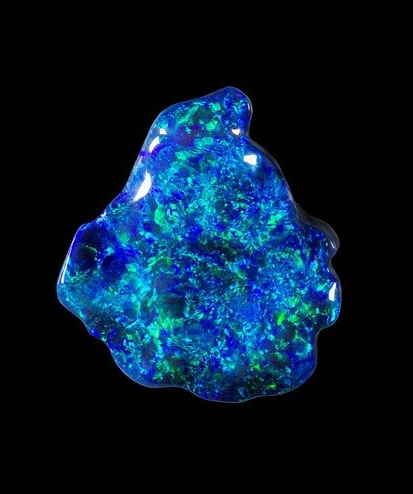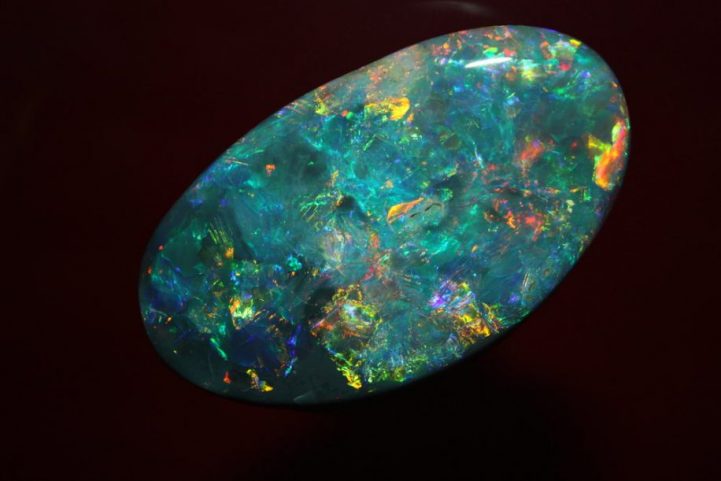
In the world of opals, Australia is the supreme ruler. Exaggerating? I don’t think so. About 90% of gem quality opals come from the continents two opal-rich areas: Coober Pedy in South Australia, the world’s largest source of gem quality opals, and Lightning Ridge, New South Wales, home to the world’s largest known deposits of black opal. All of the famous opals shown below come from these sources.
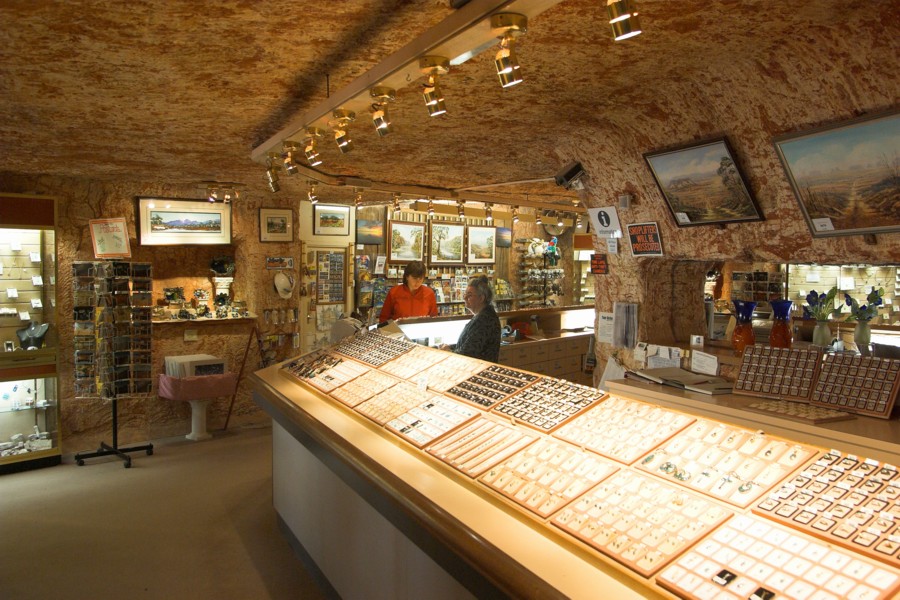
An interesting fact about Coober Pedy
As a result of scorching summer temperatures, most homes, stores, and hotels get built underground and in caves called “dugouts.” Many tourists come for this unique experience. Coober Pedy even has an underground jewelry store, see left (source). Now that is the ultimate unique selling point.
Aurora Australis
In 1938, a miner discovered Aurora Australis at Lightning Ridge, New South Wales. Believed to be the world’s most valuable Black Opal, the miner dug it from an old sea bed, and it has the distinct impression of a starfish on its back. “Aurora Australis” displays dominant red, green and blue colors against a black background. It weighs 180 carats and measures 3 inches by 1.8 inches. Both its size and strong, vibrant colors make it rare. Australian opal specialists Altmann + Cherny purchased the opal in a semi-rough state, then cut and polished it. Seeing its full magnificence, they named it “Aurora Australis “after the bright southern lights in the night sky.” It is valued at $1,000,000.
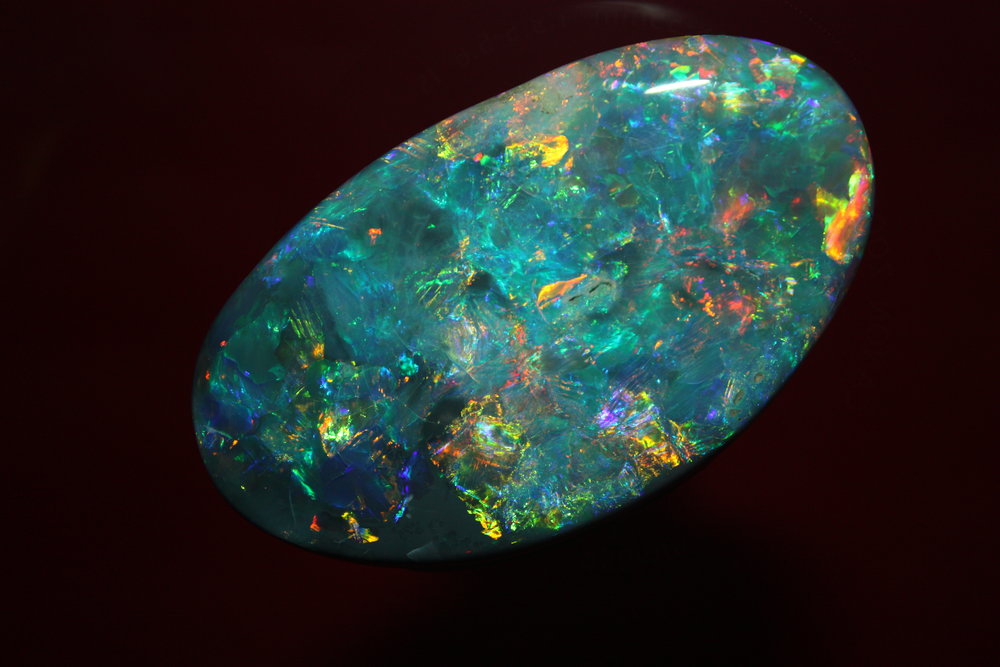
Andamooka Opal or The Queen’s Opal
In 1954, the newly crowned Queen Elizabeth II visited Australia. The South Australian Government wanted to present Her Royal Highness with a gift to honor the occasion. They trusted Altmann + Cherny to find an Australian opal of exceptional beauty and quality. The famed jewelers selected the finest gem opal ever mined at the Andamooka Opal Fields, and John Altmann personally cut it into six stones and polished them. He chose five of them to create a necklace and earrings for the Queen and cuff links for HRH Prince Phillip. The necklace became known as the “Andamooka Opal.” In 2009, Claire Altmann visited Buckingham Palace. The jewelry was on display, so she had the opportunity to see the magnificent opals her father had worked on 55 years earlier. John Altmann always maintained it was the finest opal he had ever polished.
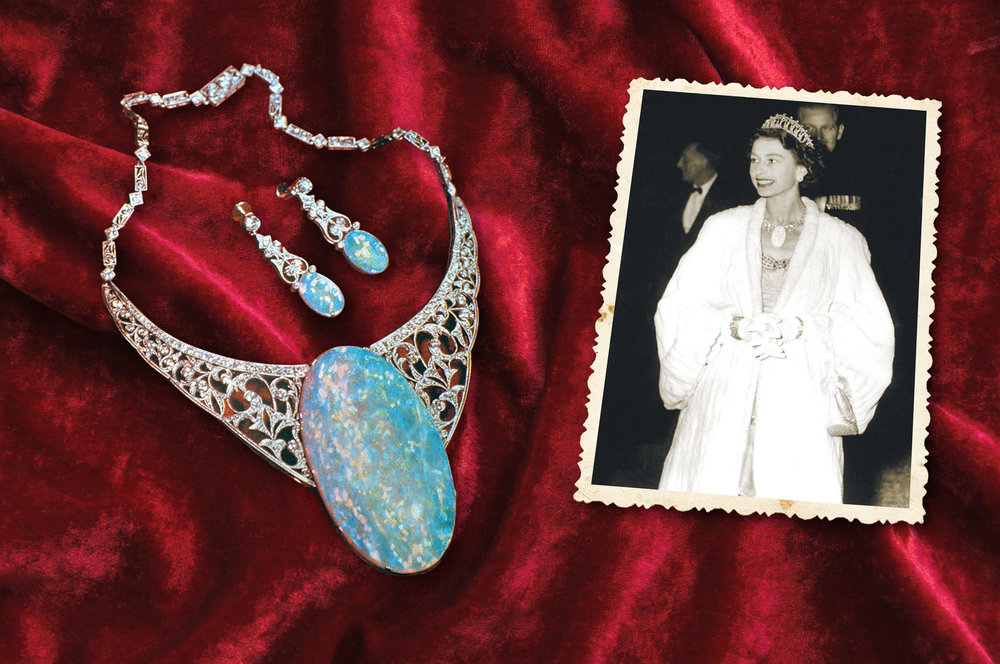
Black Prince Opal
Found in Lightning Ridge in1915, “The Black Prince” was originally called the “Harlequin Prince.” Weighing 181 carats, it has a flag pattern one side while the other side is red. A wealthy American serviceman bought it in England and donated it to the New York Museum of Natural History. Later, the “Black Prince” became part of the collection at Forest Lawn Memorial Cemetery, Los Angeles.
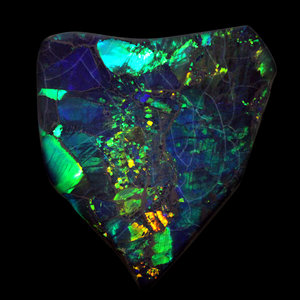
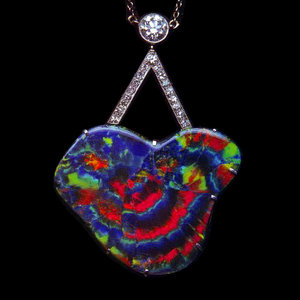
An interesting fact about Coober Pedy
As a result of scorching summer temperatures, most homes, stores, and hotels get built underground and in caves called “dugouts.” Many tourists come for this unique experience. Coober Pedy even has an underground jewelry store, see left (source). Now that is the ultimate unique selling point.
The Fire Queen
In 1906, an opal miner found the Fire Queen at the Angledool Diggings, near Lightning Ridge. The rare and remarkable stone weighs 6.5oz or about 900 carats, yet the miner had trouble finding a buyer because people didn’t understand the stone’s value. Eventually, he sold it for just $300. The Fire Queen changed hands several times and by 1928, it as in the gemstone collection of the Chicago Museum, valued at $80,000. In the 1940’s, J.D. Rockefeller bought the Fire Queen for $150,000 adding it to his prestigious family gem collection. Today, it is back in Australia. Its singular beauty with its high-domed the red and gold center opal makes it one of the most famous opals.
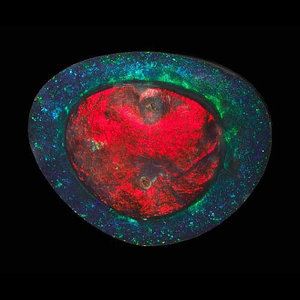
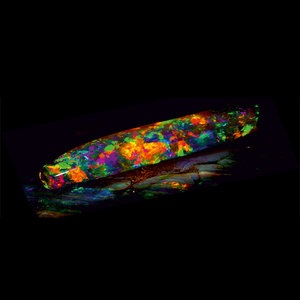
The Virgin Rainbow
Considered one of the world’s most beautiful opals, The Virgin Rainbow is the opalized fossil of a long extinct belemnite, a water creature that lived 248 to 65 million years ago. The belemnite gives it a “pipe” shape. Weighing 72.65 carats, the Virgin Rainbow is 63.3mm long and has spectacular color. In September 2003, John Dunstan discovered it at Three Mile Fields, Coober Pedy.
Halley’s Comet
Halley’s Comet holds the Guinness Book of Records top spot as the world’s largest uncut black opal “nobby,” or uncut nodule. A group of opal miners known as the “Lunatic Hill Syndicate,” found the massive stone on the Leaning Tree Claim at Lightning Ridge. The discovery occurred around the time Halley’s Comet appeared in Australian skies. It weighs 1982.5 carats and measures 100 x 66 x 63 mm. Halley’s Comet was for sale in 2005 for AUD $1.2 million.
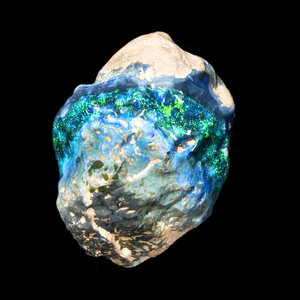
The Royal One
The miner who found this extraordinary stone goes by his first name only, Bobby. He was about to retire after 40 years of opal mining — he had even sold his tools! — when someone asked him to look through one last bucket of rough. And there it was: a blue glint among the rubble. He spent two years chipping away with a dental drill, removing the opal’s rocky husk. His efforts revealed a spectacular 306-carat gem quality opal, primarily blue with a vivid green that appears to float and flash across the surface.
Bobby held onto the Royal One for a total of 14 years, keeping its existence secret for fear of thieves. Finally, in 2013, he entrusted it to Katherine Jetter, a top Australian jewelry designer who lives in Santa Fe, New Mexico. She specializes in Australian opal designs. It was for sale for $3 million, but I can find no record of its purchase. Any buyers reading this?
